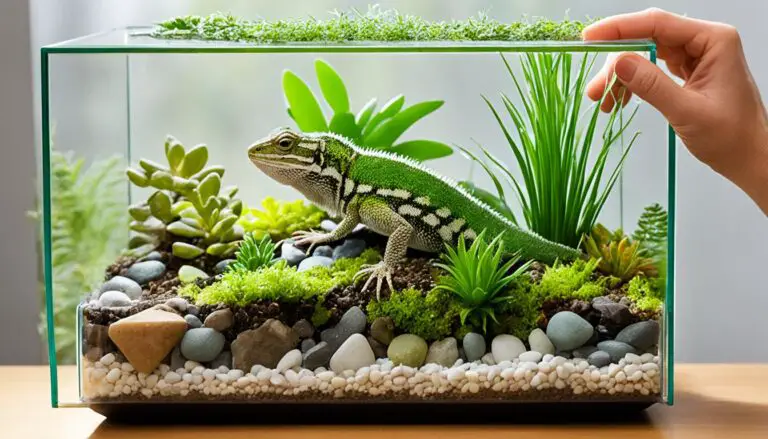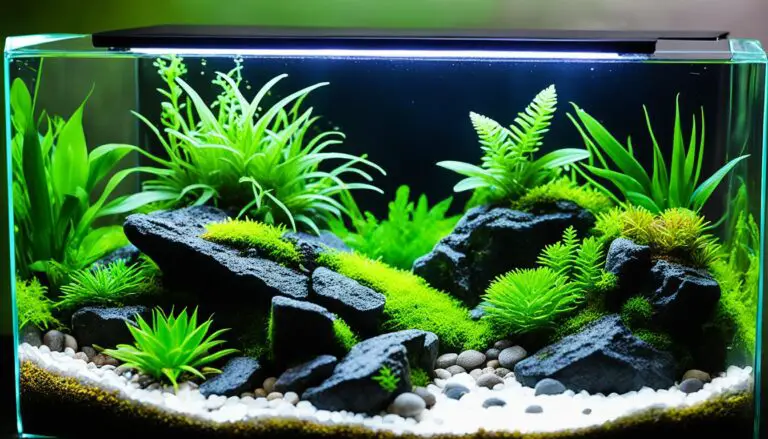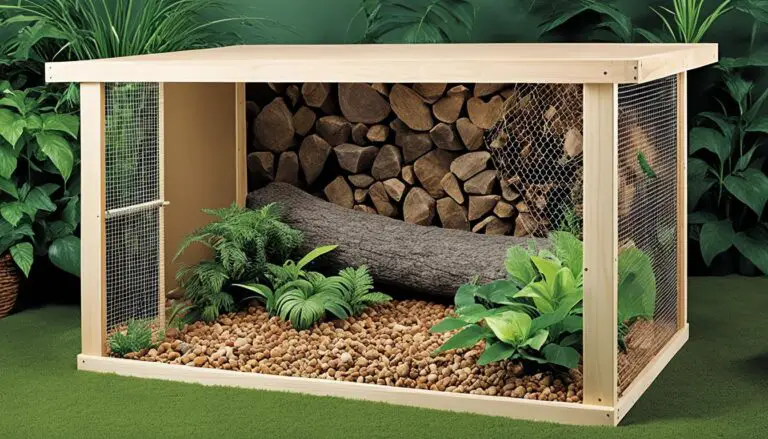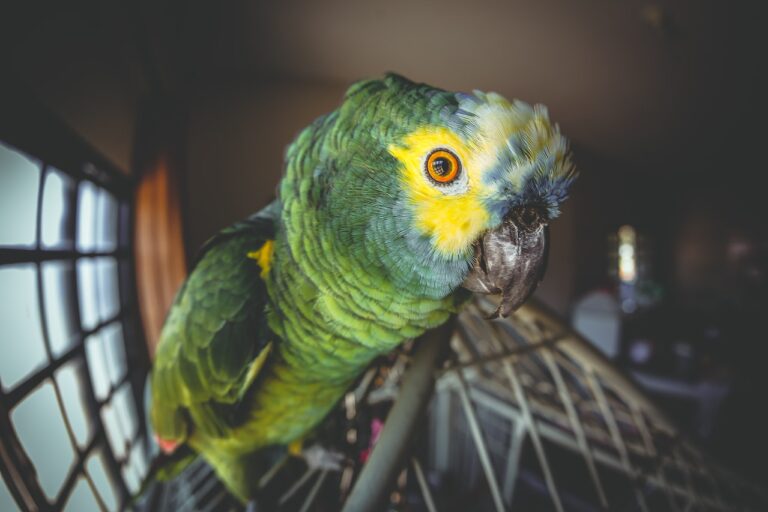Exotic Pet Housing Accessories: What to Pick
Exotic pets require unique housing accessories to meet their specific needs. From premium reptile tanks to custom amphibian habitats and luxury pet terrariums, choosing the right housing is crucial for the well-being of your exotic pet.
Exotic pets are becoming increasingly popular due to their unique characteristics and behaviors. However, before bringing one home, it’s essential to understand their specific housing requirements. Reptiles may need enclosures with appropriate lighting and temperature controls, while amphibians may require terrariums with humidity controls.
Researching and investing in the right exotic pet housing accessories ensures that your pet has a safe and comfortable environment to thrive in. From enclosures that mimic their natural habitats to accessories that provide enrichment and stimulation, each choice contributes to their overall well-being.
Key Takeaways:
- Exotic pets have unique housing requirements that must be met for their well-being.
- Choosing the right exotic pet housing accessories, such as premium reptile tanks or custom amphibian habitats, is crucial.
- Researching and investing in appropriate housing ensures your exotic pet has a safe and comfortable environment.
- Housing accessories should mimic the natural habitat of your exotic pet and provide enrichment and stimulation.
- Proper housing enhances the overall well-being and happiness of your exotic pet.
Common Health Problems in Exotic Pets
Exotic pets, although fascinating and unique, are susceptible to a range of health issues that owners should be aware of. Identifying and understanding these common health problems can help ensure the well-being and longevity of your exotic pet.
Respiratory Infections
Respiratory infections are prevalent in reptiles, birds, and small mammals, particularly if they are kept in unsanitary environments or exposed to temperature extremes. These infections can be caused by bacteria, viruses, or fungi and may exhibit symptoms such as difficulty breathing, wheezing, coughing, or nasal discharge. Prompt veterinary attention is essential to prevent the infection from worsening or becoming life-threatening.
Gastrointestinal Problems
Gastrointestinal problems, including diarrhea, vomiting, and loss of appetite, are common in reptiles, birds, and small mammals. These issues can be caused by parasites, bacterial or viral infections, dietary indiscretions, or inadequate nutrition. Proper hygiene, regular check-ups, and a balanced diet tailored to your exotic pet’s needs can help prevent and alleviate gastrointestinal problems.
Skin Problems
Exotic pets often experience various skin problems such as mites, fungal infections, or allergies. These issues can manifest as skin lesions, itching, redness, or flaking. Providing a clean and appropriate living environment, regular grooming, and seeking veterinary care when skin problems arise are crucial to maintaining your pet’s skin health and overall well-being.
Kidney Disease in Reptiles
Reptiles, including snakes, turtles, and lizards, are prone to kidney disease, often resulting from poor husbandry practices. Inadequate temperature regulation, improper hydration, and inappropriate diets can contribute to kidney dysfunction. Signs of kidney disease in reptiles include changes in urination patterns, swelling, loss of appetite, and weight loss. Consulting with a reptile veterinarian and ensuring proper husbandry practices can help prevent and manage kidney disease in these unique pets.
Liver Disease in Birds
Birds are susceptible to liver disease, which can be caused by various factors such as infection, toxins, or underlying genetic conditions. Symptoms of liver disease in birds may include loss of appetite, weight loss, increased thirst, and jaundice. Early detection through regular veterinary check-ups and providing a nutritious, species-appropriate diet can help maintain liver health in avian companions.
It’s essential for exotic pet owners to closely monitor their pets for any signs of illness or injury and seek prompt veterinary care from experienced exotic animal veterinarians. Providing a clean, enriched environment, a balanced diet, and regular check-ups can significantly contribute to the overall health and well-being of your exotic pet.

Common Health Problems in Exotic Pets
| Health Problems | Common Exotic Pets Affected |
|---|---|
| Respiratory Infections | Reptiles, birds, and small mammals |
| Gastrointestinal Problems | Reptiles, birds, and small mammals |
| Skin Problems | Various exotic pets |
| Kidney Disease | Reptiles |
| Liver Disease | Birds |
Choosing the Right Exotic Pet for You
When considering adding an exotic pet to your family, it’s important to take into account several factors that will contribute to the well-being and happiness of both you and your new companion. Each exotic pet species has unique housing requirements, and it’s crucial to research and ensure that you can provide the necessary accommodations for your chosen pet.
Exotic pet housing requirements encompass a range of considerations, including appropriate enclosures, lighting, and temperature controls. For reptiles, you may need to create an environment that mimics their natural habitat, with specific temperature gradients and UVB lighting. Amphibians, on the other hand, may require terrariums with humidity controls to replicate their native ecosystems.
Understanding the dietary needs of your chosen exotic pet is another crucial factor in providing proper care. Exotic pets often have specialized dietary requirements that may involve feeding them fresh or specific food items. For example, some reptiles may require a diet consisting of live insects or small rodents, while birds may need a variety of fresh fruits, vegetables, and fortified pellets.
Veterinary care is an essential consideration when it comes to exotic pets. These unique animals often require specialized veterinary care, so it’s important to identify and be familiar with exotic animal veterinarians in your area. Regular check-ups, vaccinations, and health monitoring are all part of the ongoing care needed to ensure the well-being of your exotic pet.
By carefully considering the housing requirements, dietary needs, and vet care associated with the specific exotic pet you’re interested in, you can make an informed decision that aligns with your capabilities and lifestyle. This research and preparation will help create a fulfilling and lasting bond between you and your exotic pet.
Common Exotic Pets and Their Housing Requirements
| Exotic Pet | Housing Requirements |
|---|---|
| Bearded Dragon | Enclosure with basking spot, UVB lighting, and temperature gradient |
| Red-Eared Slider Turtle | Aquarium with a basking area, water filtration system, and UVB lighting |
| Leopard Gecko | Enclosure with a heat source, hiding spots, and proper substrate |
| Parrot | Roomy cage with perches, toys, and opportunities for mental stimulation |
| Hedgehog | Enclosure with hiding spots, exercise wheel, and room to explore |
Remember, choosing the right exotic pet for you involves more than just personal preferences and aesthetic appeal. It requires careful consideration of the specific housing requirements, dietary needs, and vet care associated with the species you’re interested in. By taking the time to research and prepare, you can ensure that you and your exotic pet have a fulfilling and enriching relationship.
Preparation Before Getting an Exotic Pet
Before deciding to bring an exotic pet into your life, it’s crucial to take the necessary steps to prepare yourself and your living environment. Owning an exotic pet is a long-term commitment that requires careful consideration and planning. Here are some key factors to keep in mind:
Understanding the Long-Term Commitment
Owning an exotic pet is not a short-term endeavor. Many exotic species have long lifespans, and you must be prepared to provide care and attention for the duration of their lives. For example, certain reptiles can live for 20 years or more, and birds such as parrots can live for several decades.

Dedicating Time and Attention
Exotic pets, just like any other pet, require time and attention to thrive. Some species, such as birds, ferrets, and rodents, can be socially demanding and need daily interactions and enrichment activities. Moreover, you’ll need to feed and clean up after your exotic pet regularly to ensure their well-being.
Financial Considerations
It’s important to be financially prepared for the costs associated with owning an exotic pet. Beyond the initial purchase cost, exotic pets may require specialized diets, toys, and environmental enrichment. Additionally, regular veterinary care from an experienced exotic animal veterinarian is essential for maintaining their health and addressing any medical issues that may arise.
Evaluating Lifestyle Suitability
Consider whether your lifestyle is compatible with owning an exotic pet. If you have a busy schedule, frequent traveling, or limited living space, it may not be suitable to bring an exotic pet into your home. Exotic pets have specific needs that must be met consistently, and their well-being should not be compromised.
By thoroughly preparing yourself for the responsibilities and challenges of owning an exotic pet, you can create a supportive and enriching environment for your new companion. Remember, the well-being of your exotic pet should always be a top priority.
Conclusion
Exotic pets can bring a sense of wonder and adventure to our lives. However, responsible exotic pet ownership is crucial to ensure the well-being of these unique companions. By understanding and meeting their specific needs, exotic pet owners can build strong and meaningful relationships with their pets.
Providing proper housing is one of the key responsibilities of exotic pet owners. From secure enclosures to temperature and lighting controls, creating a suitable habitat for exotic pets is essential for their health and happiness. Additionally, nutrition plays a vital role in their overall well-being. By offering a balanced and species-specific diet, owners can ensure their pets receive the necessary nutrients.
Regular veterinary care is another important aspect of responsible exotic pet ownership. Exotic pets have specialized healthcare needs, and it’s crucial to find a veterinarian experienced in treating these unique species. Routine check-ups and preventive care can help detect and address any health issues early on, ensuring a long and healthy life for the pet.
Above all, exotic pets need companionship and socialization. Interacting with them, providing mental stimulation, and addressing their natural behaviors is vital to their overall happiness. With the right care and commitment, exotic pets can become cherished companions, forming strong bonds with their human caretakers and bringing joy to their lives for years to come.
FAQ
What are some popular exotic pet housing accessories?
What are the common health problems in exotic pets?
How do I choose the right exotic pet?
What should I do to prepare before getting an exotic pet?
How can responsible exotic pet ownership be achieved?
Source Links
- https://www.redbankvet.com/2017/06/how-to-pick-the-right-exotic-pet-for-your-family/
- https://currumbinvetservices.com.au/a-guide-to-keeping-exotic-pets-by-an-exotic-pet-vet/
- https://pethealthnetwork.com/all-pet-health/small-animal-health-care/exotics-101-picking-your-perfect-pet
Peter Stones is the founder of Exotic Pets Place, the leading online resource for exotic pet care information.
With over 10 years of hands-on exotic pet ownership experience, he is deeply passionate about sharing his expertise to help others properly care for their unusual pets.
When he's not writing extensively researched articles or connecting with fellow exotic pet enthusiasts worldwide, you can find Peter at home tending to his own beloved menagerie of exotic animals.

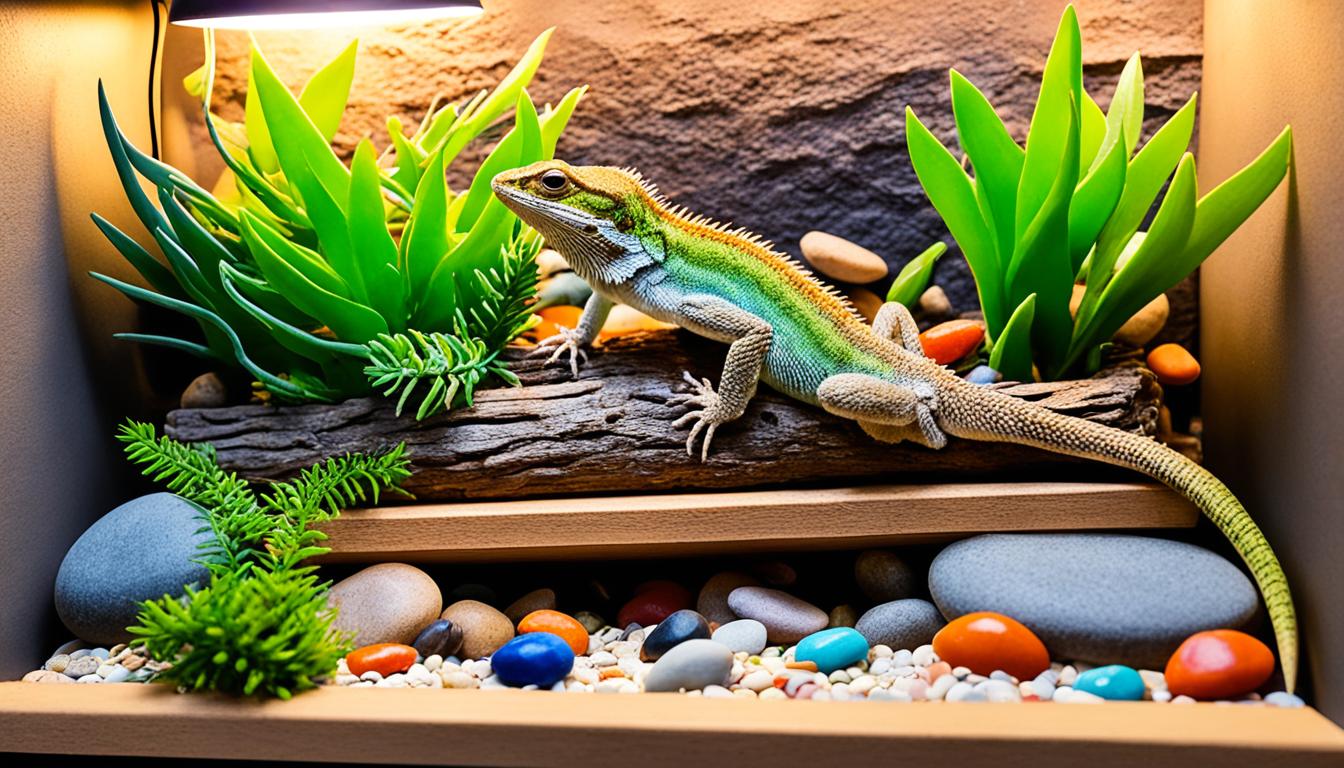
![Creating the Perfect Habitat for Your Exotic Pet [Ultimate Guide]](https://exoticpetsplace.com/wp-content/uploads/2023/07/Creating-the-Perfect-Habitat-for-Your-Exotic-Pet-a-little-chipmunk-drinking-from-a-cup-768x512.jpg)
